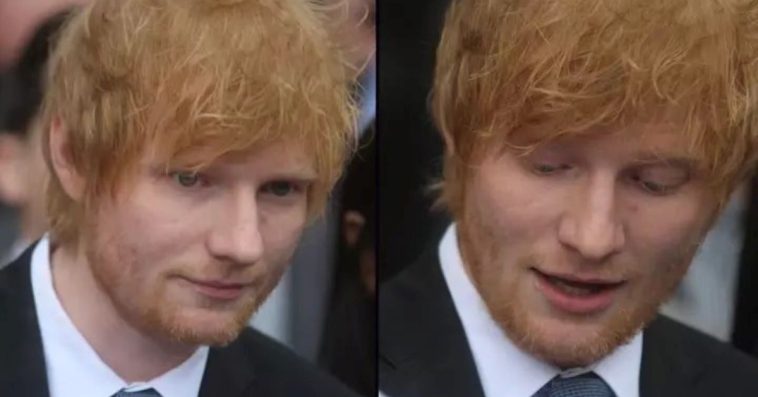The well-known singer-songwriter Ed Sheeran has won an important court case against copyright infringement. Sheeran spoke to the press while crying outside the US courthouse following a lengthy legal struggle. He also shared an emotional message with the media.
This big decision has significant implications for the music industry as a whole, in addition to being a personal victory for Sheeran.
In the case, Sheeran was charged with copying Marvin Gaye’s classic song “Let’s Get It On” for his hit single “Thinking Out Loud.” The lawsuit was filed by Kathryn Townsend Griffin. Griffin claimed that there were obvious similarities and copyright violations because of this.
Sheeran insisted on his innocence throughout the court proceedings, stating that the claimed similarities were basic musical “building blocks” that could not be protected by copyright.
The jury decided in favor of Ed Sheeran after hearing the closing arguments because they believed he had not wrongfully plagiarized the creative elements of the well-known song by Marvin Gaye.
Sheeran’s joy at the verdict in the case was tempered by his frustration with false accusations and how they might affect composers’ ability to express themselves freely.
In the sections that follow, we will explore the background of the lawsuit, delve into the court proceedings, examine Sheeran’s reaction to the verdict, and discuss the relief and perspective of Amy Wadge, the co-writer of “Thinking Out Loud.”
This landmark decision carries significance for the music industry, highlighting the delicate balance between protecting intellectual property and fostering artistic innovation.
Background Of The Lawsuit

Photo Credits – Edna Leshowitz/ZUMA Press Wire/Alamy
The copyright infringement lawsuit that captivated the music industry focused on Ed Sheeran’s hit song “Thinking Out Loud” and its apparent similarities to Marvin Gaye’s classic track “Let’s Get It On.”
The case against Sheeran was brought in 2017 by Kathryn Townsend Griffin, the daughter of Ed Townsend, one of the co-writers of “Let’s Get It On,” who claimed that Sheeran had plagiarized her father’s work.
Griffin claimed obvious similarities between the two songs, noting “overt common elements” and “striking similarities” as proof of a copyright violation.
She claimed that Sheeran had violated the rights to the original composition by forcibly incorporating important parts of “Let’s Get It On” into “Thinking Out Loud.”
Ed Sheeran, on the other hand, has continually maintained his innocence and emphatically denied any plagiarism that was done on purpose. Sheeran’s legal team claimed that the similarities were only “building blocks” of music that weren’t protected by copyright.
They claimed that musical progressions and elements are common and unoriginal, appearing as fundamental building blocks in countless music.
The lawsuit soon attracted attention inside the music industry and outside of it, posing issues like creative freedom, artistic inspiration, and how copyright law should be understood.
As the legal dispute developed, it turned into a high-stakes conflict between songwriters’ rights and the fine line between influence and infringement.
The music industry and fans alike anxiously awaited the resolution of this historic court proceedings, curious to see how it might impact the future of creative expression and copyright protection.
The scene was set for a high-profile courtroom clash, and both groups excitedly anticipated the verdict.
The Court Proceedings

Legal arguments and musical analysis clashed during the court hearings in the copyright infringement dispute between Ed Sheeran and Kathryn Townsend Griffin.
The controversy centered on alleged similarities between Ed Sheeran’s “Thinking Out Loud” and the well-known Marvin Gaye song “Let’s Get It On.”
Sheeran’s legal team claimed that the songs’ similarities were caused by shared musical elements that are not covered by copyright laws. Sheeran strongly highlighted throughout his evidence that it would be irresponsible to do the claimed act of plagiarism in front of so many people.
Sheeran even grabbed up his guitar and sang passages from both songs to show the differences in melody and composition to further prove his point. The jury gave the evidence a lot of thought before coming to the conclusion that Sheeran had not wrongfully copied compositional elements from Gaye’s hit.
The court procedures revealed the difficulties of copyright infringement cases involving music and emphasized the value of analyzing the essential components of a song. The music industry and upcoming legal conflicts involving artistic inspiration and originality will be significantly impacted by this case.
Sheeran’s Reaction To The Verdict
Ed Sheeran was apparently overwhelmed with emotion as he stood outside the courthouse as the jury’s decision was announced. He spoke to the media while crying, explaining his profound response to the historic decision that exonerated him of copyright infringement.
Sheeran’s reaction was a mixture of relief, joy, and frustration. He highlighted that the judgment supported his claims of innocence and appreciated the originality of his work as he expressed his extreme delight with the case’s outcome.
His legal burden had been resolved, freeing him to continue with his work without being constrained by the accusations.
Sheeran also criticized the fact that such false accusations were first permitted to proceed to court. He expressed his worry about the effect that baseless charges would have on the ability of composers to express themselves freely and the music industry as a whole.
Sheeran questioned the use of music for manipulative purposes and the false comparisons made throughout the trial, bringing attention to the efforts made to persuade the jury that a claim was true when it was not.
Sheeran highlighted the importance of the jury’s capacity to see through these tactics and render a fair decision in his analysis of the verdict’s implications.
He applauded the jury for carefully weighing the facts and, in the end, for appreciating the uniqueness of his composition.
Sheeran made light of a previous promise he made to leave the music business if the song was proven to be plagiarized. He said that now that he knew he wouldn’t have to quit his day job after all, he could rest. Sheeran’s underlying dissatisfaction at unfounded claims was yet evident beneath the joke.
For Ed Sheeran, the ruling brought up a range of feelings. While he delighted at his victory and anticipated moving forward with his musical career, he was unable to ignore the negative effects that unfounded accusations can have on the independence of songwriters and the creative process.
The verdict of the case strengthened his desire to defend the objectivity of his work and the industry’s artists’ creative rights.
In response to the ruling, Ed Sheeran expressed his strong belief in the outcome and his unrelenting dedication to upholding his artistic integrity.
His career took a turn for the better after the court victory, which confirmed his status as a reputable and original songwriter in the music industry.
Amy Wadge’s Relief And Perspective

Amy Wadge, the co-writer of Ed Sheeran’s popular song “Thinking Out Loud,” felt a great sense of relief after the copyright infringement lawsuit’s landmark decision.
As the court upheld Sheeran’s innocence and acknowledged the originality of their collaborative work, the years of stress and ambiguity surrounding the case were relieved.
Wadge felt a tremendous sense of relief as though a weight had finally been lifted off her shoulders. Beyond their particular song, the trial’s verdict had significant implications for the music industry. It evolved to represent the fundamentals of creativity as well as the flexibility of composers to be inspired by previous works.
The lawsuit’s premise scared her as a musician who depended on intuition and little musical understanding. It questioned the very nature of creativity and the freedom that artists have to experiment and produce work without restriction.
The positive outcome reaffirmed Wadge’s confidence in her artistic ability and the objectivity of their work, confirming her artistic decisions and attesting to the uniqueness of “Thinking Out Loud.”
Amy Wadge’s perspective and sense of relief capture the emotional flow of the case. The ruling gave her the ability to let go of years of tension and appreciate what she does as a songwriter, free from the specter of accusations.
The verdict of the case reaffirmed the significance of upholding creative freedom and artists’ rights in a music industry that is constantly changing.
Conclusion
The outcome of the copyright case between Ed Sheeran and Kathryn Townsend Griffin is historic. Sheeran’s claims of innocence were supported by the jury’s verdict, which cleared him of copyright infringement charges.
Discussions on how to strike a balance between preserving intellectual property rights and encouraging artistic creativity are sparked by this case. It sets a standard and influences how the music industry views copyright violations.
The outcome highlights the necessity for a balanced strategy that recognizes the uniqueness of each composition while upholding artists’ artistic freedom. It’s important to achieve a balance that promotes innovation while defending the rights of creators as the music industry develops.
As we conclude this article, we invite you, our readers, to share your thoughts and perspectives. How do you see the intersection between artistic inspiration and copyright protection? Join the discussion in the comment section below and let us know your viewpoint.
Don’t forget to share this article with your family and friends. It offers valuable insights into the complexities of copyright law and the impact of this landmark verdict on the music industry. Together, let’s spread awareness and appreciation for the rights and creativity of artists everywhere.


